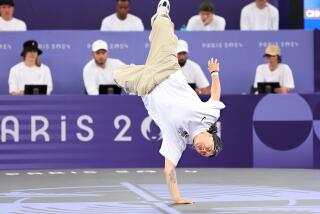Kim Yuna coasts to gold medal in women’s figure skating
- Share via
Reporting from Vancouver, Canada — They already called her “Queen Yuna” in South Korea.
And Kim Yuna spread her dominion to an absolute reign over the women’s figure skating world after the Olympic women’s figure skating final Thursday night.
Skating a stunningly difficult program without an error, floating like a feather in the wind to the airy, jazzy rhythms of Gershwin’s Concerto in F, unflinchingly bearing the weight of her country’s hopes, Kim crushed her rivals with a performance for the ages.
Mao Asada of Japan wound up a distant second, Joannie Rochette of Canada, third, and Mirai Nagasu of the United States a surprising fourth. Reigning U.S. champion Rachael Flatt was seventh.
In ending a streak of three Olympics in which the favorite had lost, Kim became the first Korean to win a figure skating medal.
She did it after beginning the season as an overwhelming favorite for the 2010 title, then justifying that status with a brilliant performance in Tuesday’s short program.
But she had a lead of less than five points over Asada going into Thursday’s long program, which lasted 90 seconds longer than the short. That was plenty of time for the expectations to play with her mind and cause mistakes, as it had for other favorites in the past.
Not this time.
“I still can’t believe my performance,” Kim said.
When Kim cried after finishing her long program, they were tears of joy and tears of release, the kind that come with winning an Olympic gold medal.
She never before had cried after a skating competition.
“I honestly don’t know why I cried,” she said. “Maybe I was relieved, maybe I was satisfied with my performance.”
She may be only 19, she may be only in her first Olympics, but Kim still revealed what she had been going through in the year since winning the world title when she said, “I can’t believe this day has finally come for me.”
It was also a relief for her coach, two-time Olympic silver medalist Brian Orser of Canada, who admitted feeling “huge pressure.” Orser was beginning his coaching career when Kim came to work with him four years ago.
There were three skaters left, including Asada, after Kim brought down the house and closed the door on the competition,
The South Korean national hero may have been a little tight on some of her early jumps, but she nailed them all: triple lutz-triple toe loop combination, four other triple jumps, all with highly positive grades of execution.
“If this was track and field, we just watched an 8-second 100 meters,” said Jamie McGrigor, a skating analyst doing in-house radio commentary.
The judges thought so. They gave Kim a free skate score of 150.06, an astonishing 13% higher than her previous world record of 133.95. She had a total of 228.56 and what would be victory over Asada by 23 points.
The two successful triple axels -- one in combination -- Asada landed would not have made a difference even if she had not later had a downgraded jump and a huge error, turning a triple toe loop into a single. She is the first woman to have landed two triple axels in an Olympic program.
“I have regrets, but I’m proud of myself,” Asada said.
It was hard to imagine the long program could produce more brilliance and drama than the short, when Kim followed Asada’s lights-out performance with one that set a world record and Rochette fought through the pain of her mother’s unexpected death three days earlier to skate flawlessly and stand third.
Rochette held together again, winning the bronze despite a stepout on a jump.
Nagasu, 16, of Arcadia, stamped herself as a contender for the 2014 Olympic title with a clean free skate that jumped her from sixth to fourth, 12 points behind Rochette.
It ended a remarkable comeback for Nagasu, who had become national champion at 14 two years ago but followed it with a 2009 season that left her unstrung physically and mentally. She got it back together after changing coaches, moving to Frank Carroll -- who also coached Evan Lysacek to Olympic gold last week -- last spring.
“I just want to keep rising along,” Nagasu said.
Nagasu was the last skater to perform, and this was her first major international competition.
“It was as stressful as they say. But I was able to beat that pressure,” she said.
Flatt, fifth in the short program and seven points behind Rochette as she took the ice as the first skater in the last group, did exactly what everyone expected: a seemingly solid program.
But both of Flatt’s triple flip jumps were downgraded to doubles, costing her up to 10 points and possibly three places in the standings.
It was the first time since 1964, three years after the plane crash that wiped out the elite of U.S. skating, that its women failed to win an Olympic medal.
The pressure may have been worse for Kim in Tuesday’s short program, where a major mistake could have cost her enough points to put the gold medal all but out of reach.
“When the pressure is gone, there is a lightness to her skating,” Orser said of Kim. “There’s still some [weight] left, but most of it is gone. I think she is just going to soar after this.”
Did she ever.
More to Read
Go beyond the scoreboard
Get the latest on L.A.'s teams in the daily Sports Report newsletter.
You may occasionally receive promotional content from the Los Angeles Times.







